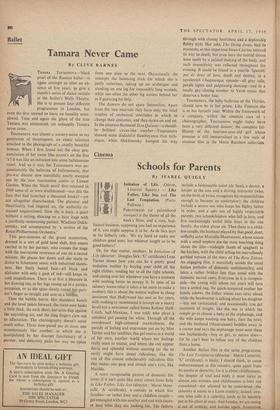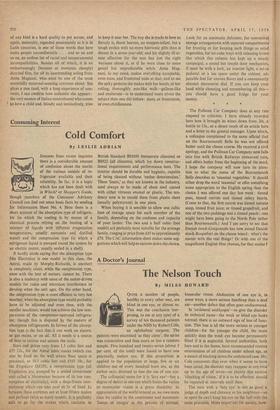Cinema
Schools for Parents
QUIGLY By ISABEL Imitation of Life. (Odeon, Leicester Square.) — Like Father, Like Son and The Last Temptation. (Paris- Pullman.) PARENTHOOD (or palrenthood manque) is the theme of all the week's films, and a rum, hap- hazard business, supposing you had no experience of it, you might suppose it to be. As de Sica says in his fatherly role: 'We try hard to make our children good sons; but whoever taught us to be good fathers?'
Or, for that matter, mothers. In Imitation of Life (director : Douglas Sirk; 'LP certificate) Lana Turner shows how you can be a pretty good imitation mother by buying your child all the right clothes, sending her to all the right schools, and cooing over her when-ever you have a moment with nothing better to occupy it. In spite of its salutary lesson (that it takes a lot more to make a mother), this is about the wettest wallow in cheap sentiment that Hollywood has sent us for years, with nothing to recommend it (except on a sneery level) but a newcomer called Susan Kohner (half- Czech, half-Mexican, I was told) who plays a coloured girl passing for white. Through all the overdressed high-coloured mawkishness, the parody of feeling and expression put on by Miss Turner and her satellites, this girl moves in a world of her own, another world where her feelings really seem to matter, and where she can appear fierce and splendid without seeming (as she so easily might have done) ridiculous; like the rest of this almost unbelievably ridiculous film that makes one gasp and stretch one's eyes, like Matilda.
A more recognisable picture of domestic life (even if it isn't quite like ours) comes from Italy in Like Father, Like Son (director : Mario Moni- celli; 'A' • certificate), a comedy in which five families—or rather four, and a childless couple— get entangled with one another and end with (more or less) what they are looking for. The fathers include a fshionable tailor (de Sica), a doctor, a keeper at the zoo, and a driving instructor (who, on the birth of twins, recognises his responsibilities enough to become an undertaker); the children include a severe son who keeps his flighty father in order, and a spiv son of highly respectable parents, two schoolchildren who fall in, love, and five enchantingly awful little boys in the one family, the eldest about six. Then there is a child- less couple, the husband played by that good, dour, unflashy actor Marcello M astroianni, whose scenes with a small nephew are the most touching thing about the film—midnight feasts of spaghetti in the kitchen, with the child telling his marvellously garbled version of the story of The Rose ,Tattoo. An engaging film, it mercifully avoids the usual Italian potholes of domestic sentimentality, and takes a rather brisker line than usual with the domestic sacred cows. Everyone in it is recognis- able—the young wife whom ten years will turn into a settled nag, the quick-tempered mother her family adores, the father whose eyes stray about while the headmaster is talking about his daughter —but not caricatured; and occasionally you get moments of insight, like the one in which the couple go to choose a baby at the orphanage, and the wife keeps wanting one baby, then the next; and the husband (Mastroianni) huddles away in a corner and says the orphanage must send them one haphazardly—boy or girl, as nature does— for he can't bear to refuse any of the children there a home.
Another Italian film in the same programme, The Last Temptation (director : Mario Camerini; `Li' certificate), is likely, I should think, to cause embarrassment in this country, quite apart from its merits or demerits; for it is about childlessness; the despair of soul and body it must mean to almost any woman, and childlessness is here not considered—not allowed to be considered—the calamity it seems in a Latin country; indeed, any- one who calls it a calamity tends to be sensibly put in his place at once. And besides, we are seeing it out of context; and besides again, frustration of any kind is a hard quality to put across; and again, maternity, regarded passionately as it is in Latin countries, is one of those words that here make people uncomfortable . . . and so on and so on, an endless list of racial and temperamental incompatibilities. Besides all of which, it is an embarrassingly (because at moments cheaply) directed film, for all its heartrending acting from Anna Magnani, who. must be one of the most essentially maternal-seeming actresses about. She plays a nun (and, with a long experience of con- .vents, I can confirm how authentic she appears: the very essence of Italian nunnishness) who comes to love a child and, blindly and instinctively, tries to keep it near her. The boy she is made to love so fiercely is, thank heaven, no moppet-infant, but a tough urchin with no more histrionic gifts than is decent in a seven-year-old; and his slightly ill-at- ease affection for the nun has just the right wariness about it, as if he were close to some genial but unpredictable witch. Anna Mag- nani, to my mind, makes everything acceptable, even nuns, and frustrated nuns at that; and to see the spiky gestures she makes with her hands, or her rolling, thoroughly nun-like walk—galleon-like and exuberant—is to understand more about the subject than one did before: nuns, or frustration, or even childlessness.



































 Previous page
Previous page